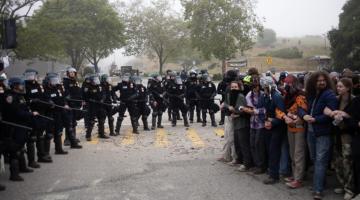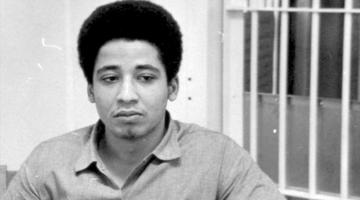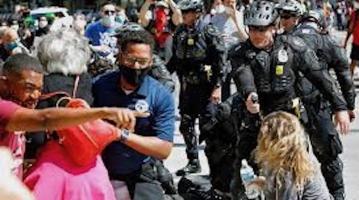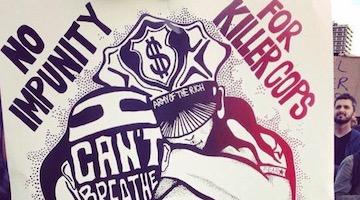Notes Toward a National Defense Organization Against Racism and Political Repression, 1973
Few records survive of the birth of a national anti-police repression organization formed by supporters of Angela Davis – but government spies preserved Davis’ speech.
“We are here to build a united organization to defend existing movements, and to defend our communities from racist and politically inspired attacks.”
Introduction
On Saturday May 12, 1973, Angela Y. Davis gave the keynote address at the opening convention of the National Defense Organization Against Racism and Political Repression (NAARPR), held in Chicago, Illinois. Less than a year earlier, Davis had been acquitted on framed-up charges of murder, kidnapping and conspiracy, and the organizers of the Free Angela Davis and All Political Prisonerscampaign wanted to channel the energy of the two-hundred plus Free Angela Davis committees into a new, broad-based national defense organization. Led by members of the Communist Party USA, the three-day Chicago convention drew more than seven-hundred delegates from across the political spectrum. Participants included representatives from the American Indian Movement, the Conference of Black Lawyers, Vietnam Vets Against the War, the Puerto Rican Socialist Party, the War Resisters League, the Attica Defense Committee, and the United Farmworkers Organization, to name just a handful of the dozens of groups listed on the program. Their aim was to create a provisional structure for what would be called the National Alliance Against Racist and Political Repression (NAARPR) while drawing up a coalitional political program. The program itself would focus on “repression and labor, repression and the military, prisons and prisoners, repressive legislation, immigration and naturalization, repression of political groups, and police brutality.” Workshops were held on police crime and community control of policing, with the conference attendees endorsing the program of the Chicago Campaign for Community Control of Police.
“Their aim was to create a provisional structure while drawing up a coalitional political program.”
Titled “Organized Struggle Against Racist and Political Repression,” Davis’s keynote set the tone of the Chicago conference. Wide ranging and radical, she addressed the question of political repression against labor, farmworkers, and prisoners, and the struggles of Puerto Ricans, Chicanos, Asian Americans, and Native Americans. She evoked the bankruptcy of US political elites, of imperialism, and of the crisis of capitalism -- and of the growing threat of fascism in the 1970s.
While the NAARPR was re-launched and refounded in Chicago in 2019, with Angela Davis again giving the keynote, we were surprised at how little was known about the inaugural convention and the activities of the original organization. Our initial searches of political sites and academic studies dedicated to Black radicalism failed to uncover much information on the NAARPR and on the discussions and debates in Chicago. We eventually discovered documents on the conference in a private academic database archiving materials from the U.S. Congressional Hearings. Investigators and agents for the House Committee on Internal Security (ostensibly formed to investigate “Communist and other subversive activities affecting the internal security of the United States”) were present during those three days in Chicago and they had comprehensively documented (that is, infiltrated and spied on) the convention. They generated an extensive archive of the formation of the NAARPR for the Congressional record. The archive includes copies of articles from Communist Party journals on the development of a national defense organization, flyers and leaflets on the Free Angela Davis campaign, a program for the conference, and transcripts of the keynotes by Davis, AIM’s Clyde Bellecourt, Jose “Che” Velasquez of the Puerto Rican Socialist Party, the feminist labor leader Dolores Huerta, and others. Many of these items were intercepted by agents from a mailing from Communist Party member Charlene Mitchell, founding executive director of the NAARPR.
We found Davis’s keynote address in the appendices of the July 25, 1973 congressional testimony of investigator Richard R. Norusis on “Revolutionary Activities Directed Toward the Administration of Penal or Correctional Systems.” To our knowledge, her keynote has not been previously published in full. As the scope and politics of Davis’s address embody our first principles while offering political lessons for us today, we reproduce it in its entirety below.
Charisse Burden-Stelly
Peter James Hudson
Jemima Pierre
Editors, The Black Agenda Review
*Special thanks to Jessica Newby for transcribing this speech.
Organized Struggle Against Racist and Political Repression
Keynote Address to the Founding Conference for a National Defense Organization Against Racist and Political Repression, May 12, 1973, Chicago, Illinois, USA..
by Angela Y. Davis
Sisters and Brothers, Delegates and Friends,
We have come here this weekend to fulfill an historic task. Having accepted the responsibility of uniting and fortifying the fight against repression, we are here to collectively found a National Defense Organization. We are here to raise the foundation for a more far-reaching, more organized, more vigorous movement against racist and political repression. We urgently need such a movement. We urgently need such an organization because we urgently need to protect our rights, our liberties, our struggles and our lives.
Repression today is more conspicuous than ever before. It is open; it is systematic, and it contains a very deadly potential. All around us we see our legitimate movements against an unjust, racist status quo coming under severe attack.
The political inspired repression of this period seeks to engulf all progressive movements. Black liberation struggles are under attack; liberation movements of Chicanos, Puerto Ricans, Latinos and Asians are being violated. And today, we must be especially conscious of the government’s attempts to disrupt and destroy the Indian people’s just struggles for Independence and sovereignty.
With the collusion of corrupt trade union bureaucracies, the government seeks to suppress rank and file workers’ movements. The anti-war movement, which has to carry on the fight for an end to the bombing in Laos and Cambodia, continues to be attacked as well. And so, our united defense organization will have to be able to push back this repression; it must be able to provide a protective shield for all of these movements and for all progressive causes.
Mounting political repression is complemented by mounting police violence and routine frame-ups in the ghettos, barrios and on the reservations. The law and order stance of the Nixon Administration has provided the go signal for this renewed racist offensive. Repression at the community level, buttressed by Supreme Court decisions and law and order legislation, is also becoming more concentrated and systematic. We are therefore compelled to form a national defense organization which can protect and defend all of those who are victims of the racism and class-bias of police, courts and prisons.
“Our united defense organization it must be able to provide a protective shield for all of these movements and for all progressive causes.”
And so, we have to say that the perilous trends of these times leave us with no alternative but to undertake the task of forging this weapon for the people to wield in our life and death struggle against repression.
The conveners of this conference have asked me to deliver the opening address, and I accepted that responsibility, because I have not only been a victim of repression, but I was extricated from that apparatus by a people’s movement. I would like to take this occasion to express my deepest gratitude to all of you here this morning who participated in the movement to free me. The campaign for my freedom taught us lasting lessons—lessons which we must draw on today in the movement to defend all political prisoners and all victims. This movement taught us how we must unite and how we must organize in order to achieve more such stunning people’s victories.
We are prepared today to build a new organization against repression which can unite vast numbers of people in our battle. We are building a new organization, but we all know that repression itself is not new. On the contrary, it has been a constant thread in the historical fabric of this country. There is, however, a new quality and a new urgency about the repression of this period. I submit to you that this new quality, and this unprecedented urgency emerges because the repression we face today contains the fatal germ of fascism.
Let this be the thesis of my remarks: The special danger of repression today is the embryonic fascism it announces.
We should discuss in detail this fascist-like quality of repression today. But first, we should explore the history of repression in this country. We need this historical background in order more fully to understand the present times and the nature of our present responsibilities in the fight before us.
“The repression we face today contains the fatal germ of fascism.”
Repression is no stranger to us and our forebears.
The United States of America made its historical debut through the barbaric kidnapping and enslavement of African men and women. In order to make cotton king of the early Southern economy, my ancestors were systematically denied their humanity. This country, in its infancy, embraced an official policy of genocide vis-à-vis the Indigenous people. To serve the interests of the emerging cattle barons, the land grabbers and the railroad industrialists, the Indian people were viciously driven from their own land and herded into concentrated reservations.
This is a country whose expansion to the pacific coast was completed by the violent annexation of half of Mexico. Like Black people, like the Indians, the Mexicans were assaulted in the interests of a growing capitalism.
The economy of this country, moreover, was built on the importation of cheap labor from Asia and Europe.
It was founded on the colonization of Puerto Rico and the inhabitants of the Caribbean.
So much of the history of the United States of America is the history of slavery, genocide, annexation, colonization, exploitation.
But, Sisters and Brothers, our people would not willingly deliver their labor, their land, their lives, their families to the ruling classes of that time. They refused to acquiesce in the oppression imposed upon them by the dominant class. And their refusal was collective and wide-spread. That is why the wealthy—the slave owners, the landowners, the industrialists—found it necessary to resort to repression.
Much of the history of the United States of America is the history of repression. But it is also a history of a continuous struggle for freedom—a struggle for equality, a struggle for self-determination, and a struggle for a fair share of the wealth of this land.
The history of slavery is not only the history of the slaveowner—as the ruling class historians have tried to make us believe. It is also the history of the struggles of the slaves. It is the history of slave revolts—of Nat Turner, Denmark Vesey. It is the history of Harriet Tubman, Frederick Douglass and John Brown.
“Our people refused to acquiesce in the oppression imposed upon them by the dominant class.”
The history of the subjugation of the Indians is not only the history of General Custer and his colleagues. Much more meaningfully, it is the history of the heroic resistance of Sitting Bull, Crazy Horse, Cochise and Geronimo.
The history of the annexation of the Mexican people in the Southwest is also a history of struggle. It is the history of Josepha, of Juan Cortina, Jasinto Trevino, Joaquin Murieta.
And the history of the colonization of Puerto Rico is also the history of the fight for independence. It is the story of Eugenio Maria de Hostos, of De Diego, and of the heroic Don Pedro Albizu Campos.The brunt of repression in its myriad forms has been historically aimed at peoples of color. But it is also true that white people who have come into conflict with the existing economic and social system have been made targets of the officially sanctioned repression. Let us recall the white people who were active in the abolitionist movement; those who resisted the Indian wars, and the war against Mexico; those who organized the guilds and the unions; those who fought for the suffrage of women; and those who, like Eugene Debs, resisted the imperialist aims of the first world war.
White people who fought these battles and left their daughters and their sons with a legacy of struggle were also put in jail, shot, beaten and killed.
The historical forms of repression we have been discussing were those which attended the birth of the U.S. economy. The repression of this period went hand in hand with the earliest growth process of the country—the building of the cotton economy in the South, the expansion westward, and the eventual industrialization of the economy.
Let us now consider a second era in the history of this country—an era, in which repression itself also undergoes a change.
Some sixty years ago, the capitalists began to search for new markets and new sources of raw materials. Reaching out to conquer new lands, the United States became an imperialist power. “Manifest Destiny” meant not only stretching out to the Pacific, but also across the Pacific to the Philippines. Colonial rule in Puerto Rico was consolidated and Cuba was conquered. In the journalism of the time, Latin America became known as “our own backyard.”
If we follow this trend up to the early period of the war in Indochina, we see Dean Rusk (you remember Dean Rusk?) saying in a Lookmagazine article that “the Far East is now our Far West.”
When the United States became an imperialist power, repression had to take on an international character. In order to conquer new lands, it was essential to try to destroy Indigenous movements for self-determination abroad. Drastic forms of repression are imposed upon struggling people in the underdeveloped countries of Asia, Africa, and Latin America. Repression becomes the sidekick of imperialism. And in this country anti-imperialist forces come under severe attacks. Consider the McCarthy period; consider the fact that Henry Winston, a Black man, the Chairman of the Communist Party, spent many years of his life in prison because of his struggles against imperialism, and became blind because of the atrocious medical conditions.
“In order to conquer new lands, it was essential to try to destroy Indigenous movements for self-determination abroad.”
Before we go on to consider a third era, that is, the present era, and the present character of repression, let us attempt to make some generalizations.
Throughout the history of this country, the heaviest burden of repression and suffering has been borne by people of color—by Black people, Brown people, Red people, and Yellow people.
The ideology of racism has been systematically used to justify this subjugation. Moreover, racism has been invoked historically as an efficient tool of division. It has been used to divide and attempt to divide people of color among each other. We remember, for example, that Black Buffalo soldiers were sent to attack the Indians. By systematically imposing racist attitudes on the majority white worker and farmer population, racism has been used to sever peoples of color from those who would otherwise be their natural allies.
In exploring the first two eras of the history of this country, we have seen that repression is not new to this country. Repression is invoked whenever the rulers want something from the masses which the masses of people are unwilling to give up. Repression is invoked both here and abroad whenever large numbers of people begin to democratically assert their collective will. It is invoked when they have to be suppressed if the old ways of oppression are to continue to prevail.
Repression is used both by the owners of wealth and the state which reflects their views, for the purpose of quelling and eliminating real and potential opposition to the oppressive status quo.
Let us move on to the third era.
If we examine the background of this present era, we discover that since the United States became an imperialist power, there have been many new developments. Over fifty years ago, the Bolshevik Revolution removed one-sixth of the world’s land mass from foreign domination. After the second World War, we witnessed the Chinese Revolution, the Vietnamese, Korean, Bulgarian, and Cuban revolutions. In Eastern and Central Europe, fascism was defeated and the socialist camp began to grow tremendously.
Today one-third of the people of the world are no longer within the orbit of imperialism. When the heroic Vietnamese people tied down the U.S. military apparatus for a dozen years, and finally expelled it from South Vietnam, an extraordinary victory over imperialism was achieved.
The physical and ideological strength of all the socialist countries have changed world relations. This change has made it possible for national liberation movements to push realistically on towards victory. Consider Africa, for example. As Amilcar Cabral himself pointed out, before he was so viciously assassinated, this change in world relations, this growth of the socialist forces has allowed the movement inside Portuguese Guinea to reach a point where the freedom fighters are on the verge of defeating the colonialists.
“Repression is invoked both here and abroad whenever large numbers of people begin to democratically assert their collective will.”
This new shift in world relations allows countries in this very hemisphere to seek real paths of self-determination. Chile, Peru, and now Panama can thus stand up to the colossus of North America.
We are facing, Sisters and Brothers, a new historical situation. Those who rule this country find themselves in a new era, an era in which they are confronted with rising threats to their power.
It is within this context that we should try to understand the fascist seed contained in the presently existing repression.
The ruling class is being thrust into a desperate situation. Their options abroad have been severely limited. Internationally, U.S. corporations can no longer plunder, exploit and oppress at will. People’s movements throughout the world resist their presumptuous incursions. The severe crisis of their currency—the U.S. dollar—is yet another symptom of the decline of their global influence.
But the fact that U.S. corporations can no longer call all their shots abroad should not lead us to conclude that they have given up the game. On the contrary, their strategy is to resort to all the dirty tricks they can contrive. They not only utilize military apparatus, they call upon the conspiracies and sabotage operations of the CIA and other official conspiratorial agencies.
The corporations and their protectors in government are now engaging in open alliances with the most racist and the most fascist regimes abroad. Consider for example, the growing ties with the Vorster regime in South Africa. Take, for example, the projected dismantling of a Firestone rubber plant in Akron, Ohio, the laying off of its predominantly Black workers, and the re-erection of this plant in the Portuguese colony of Mozambique where African workers will be paid a mere 20 cents a day.
Is it not possible to say that a ruling class so willing to support fascism abroad will not find it difficult to resort to fascist tactics at home—especially if it is a question of rescuing themselves and their profits?
The rulers are desperate. They are desperate because their profits are indeed being threatened abroad. They have decided to try to compensate for these losses by turning on working people and poor people here at home. As with any escalation of domestic oppression, Black, Brown, Red and Yellow people will suffer hardest and longest.
This desperation is the content of the wage freezes—wage freezes complemented by price-gouging of consumers. This is why General Motors, American Telegraph and Telegram, and Standard Oil could report record profits for the first quarter of this year.
This is also the meaning of the budget cuts—the elimination of any pretense at welfare, the dismantling of the so-called poverty programs, the cuts in medical assistance, financial assistance for students, etc., etc. These things are simply unprofitable for the capitalist economy.
This new drive for profits through wage freezes, ruthless speedups accompanied by layoffs, the elimination of social programs, is being pursued at the expense of working people.
Already, the material base for fascism has been established. We should remember that in 1935, Georgi Dimitrov, when he analyzed fascism, defined it as a period in which the options of the class in power begin to drastically diminish, and they have to begin “…to shift the entire burden onto the shoulders of the workers.” That is why they need fascism.
“The material base for fascism has been established.”
They need fascism in order to carry out an intensification of exploitation, for in order to do this it is absolutely essential to them to eradicate all existing channels through which resistance may be expressed.
The Nixon administration, acting for the big corporations, is moving in this direction. They recognize that in the recent presidential elections, 87% of all Black people who voted, voted against Richard Nixon. They know that there is a tremendous potential for resistance. There have recently been massive demonstrations against the budget cuts, high prices, wage controls—thousands of people have come out in Washington, San Francisco, Detroit and throughout the country.
They know more and more people in this country are beginning to move towards far more radical solutions than the mere replacement of one government administration with one another. More and more people are going to refuse to be silent; they will refuse to accept their assigned places in Nixon’s new majority; they will refuse to shoulder the imperialist burden.
The Nixon administration and those for whom it speaks are therefore trying to eliminate the existing channels of democratic expression and opposition. And this policy is being carried out by official institutions at every level of the society—by the Supreme Court, by local courts, police departments and prisons.
Look, for instance, at the State of North Carolina. Scores of political activists—Black, Indian and white—including the Rev. Ben Chavis, are now under indictment, or are filling the jails and prisons in that state. If you study the situation there, it is almost impossible not to conclude that North Carolina is becoming a testing ground for the new political repression. The assault there on the Black Liberation Movement is total—it is systematic. That is to say, whoever resists can expect to be framed.
For a further glimpse into this new repression, think about what happened at Wounded Knee. Hundreds were arrested, indicted or otherwise charged with crimes. For the first time since the passage of the so-called Rap Brown Anti-Riot Act this law was used on a massive scale. People in many states were arrested simply because it was thought that they were on their way to Wounded Knee—or simply because they were Indians and looked like they might be on their way.
We see the systematic character of repression reflected on the community level. Local police agencies are being turned into paramilitary units. They may be assassination squads, like STRESS in Detroit; they may be off-duty armed vigilante groups, such as the Patrolmen’s Benevolent Association in New Jersey, which has launched an attack against George Merritt of the Plainfield 4; they may be uniformed policemen with shotguns as in New York City, where they recently shot down a ten-year-old Black child, because, they said, he looked like a robbery suspect. They may be police provocateurs who appear at grand jury hearings and “conspiracy” trials having hidden under left covers. And there is the so-called “National Caucus of Labor Committees” which leads armed assaults on meetings under the cover of the Left.
“Level. Local police agencies are being turned into paramilitary units.”
Repression continues to prevail within the prisons. We will never forget the vicious assassination of George Jackson, who was a trailblazer of the movement behind the walls. We know that Governor Rockefeller, with the approval of Nixon himself, ordered the Attica massacre. The Attica Brothers are still under indictment as are the San Quentin Six in California. And my former co-defendant, Ruchell Magee will soon be facing a second trial.
But these are not the only signposts pointing in the direction of fascism in this country. In fact, what is perhaps the most striking evidence of the intensification of repression, and its internal fascist potential, is the effort to emasculate even the powers of Congress.
Moreover, the ruling circles try to silence the television networks and the metropolitan newspapers which don’t even question the basic assumptions behind this society. Reporters were recently arrested for filming scenes at Wounded Knee, and many of them must face prison terms for refusing to relinquish confidential sources to courts and Grand Juries.
Sisters and Brothers, it is more than appropriate that we are meeting at a time when the Watergate scandal is still raging at full force. For the Watergate Affair throws into bold relief the point I am trying to make.
What Watergate shows is that men in government—and they are primarily men—are capable of the worst kind of criminal conspiracies against the rights and liberties of the people of this country. In the same way, the Pentagon Papers showed that a small group of men sat down and plotted against the peace of the world—and it was Dr. Ellsberg and Anthony Russo who were treated as criminals. We should recognize the stunning victory that was achieved yesterday with the dismissal of all charges against Ellsberg and Russo.
We must try to understand what is happening within the ruling class of this country. Watergate lets it all hang out. Let us briefly look at the men involved in the Watergate plot to understand the character of this class that presumes to rule over our lives.
The original group of burglars included six veterans of the CIA, five of whom participated in the attempted invasion of Cuba at the Bay of Pigs. One of these was the paymaster for the invasion, another was the chief of staff. The latter, E. Howard Hunt, was apparently the head of the White House Dirty Tricks Department, because he was also the one who visited Dita Beard, the ITT lobbyist in order to quiet her in that particular scandal.
Another member of the group of burglars—James McCord-- was an FBI agent for 20 years, and was then the head of security for the CIA, after which he became head of security for the Republican Party. He was also an Air Force reserve officer who was attached to a special unit in the basement of the White House—a special unit in charge of compiling lists of U.S. revolutionaries to be rounded up in case of a so-called “national emergency”.
Gordon Liddy, who quarterbacked the Watergate operation and made the payoffs, is another former FBI agent. But above this group of thieves were those who headed the plot. They include: a former Secretary of Commerce and chief fundraiser for the Republican Party; a former Attorney General—the national Grand Dragon of the Law and Order Klan, who was Nixon’s closest friend and law partner. Pursuing the list of the heads of the plot, we find the succeeding Attorney General who was a Goldwater underling; we find Nixon’s chief Presidential counsel; Nixon’s personal attorney who apparently bankrolled the operation; Nixon’s appointments secretary, now a United Airlines official; Nixon’s two top lieutenants, Haldeman and Ehrlichman, who, incidentally, have just hired as their attorney a man who also handles the U.S. Steel Interests, the National Rifle Association, who is Senator Goldwater’s attorney, and who for years represented the Swiss-based General Aniline Corporation. General Analine was a front for the West German Farbin interests which supplied the gas for the mass murders in Nazi concentration camps.
“The Pentagon Papers showed that a small group of men sat down and plotted against the peace of the world.”
Sisters and Brothers, this is the record of the men with whom we are dealing when we deal with Watergate—when we deal with the President of the United States of America. Thievery, perjury, bribery, burglary, collusion, corruption, forgery, lying, conspiracy—these are their crimes and the world knows it. It will be interesting to see if Mr. Nixon maintains his posture of “punishment without pity” in this case. Already his adviser, Henry Kissinger, has come forward to urge compassion for these men in their agony. Perhaps he will soon urge amnesty.
We needn’t be surprised at the crimes of this government. After all, did it not drop the equivalent of 900 Hiroshima bombs on the peoples of Indochina, creating a thousand My Lais in Vietnam, Cambodia and Laos? It does, after all, supervise torture in Brazil and Uruguay. It holds Puerto Rico in bondage; it supplies napalm to Portugal and Israel to use against the African and Arab peoples. And this government supports every fascist and racist regime in the world.
It has no regard for human life. Corporation profits come first. This is the stuff out of which fascism is made. For what is fascism if not monopoly capitalism without the trappings of a democratic state. And it is these very trappings of democracy that some of the most powerful forces in the country are not attempting to eliminate.
It is in this connection that we should understand the deeper meaning of Watergate. Nixon and his entourage have been fundamentally exposed. But I think there’s a problem. I think that many of us who are in the radical and progressive movements are tending now to take an “I told you so” attitude without fully examining the dangers of this affair. Because I think that is quite possible that Richard Nixon and his cohorts can say: Since we have already exposed ourselves, why not leave it out in the open? Why not seize upon this opportunity to consolidate the reaction, to move further in the direction of fascism?
We must beware of this possibility. We must be vigilant. We will have to realize that if we gloat too long about this crisis in government, if we gloat without acting, then the most reactionary rulers, led by Richard Nixon, may well begin to seek a truly fascist solution.
We talk about the development of fascist trends—racism is indeed the very element that can stimulate the development of these trends, for racism is the weapon that can divide potential resistance against itself. It can provide the scapegoat for national crisis, thus allowing the main criminals of society to escape responsibility.
Racism cuts through all aspects of the repression we are considering this weekend. As in the past, the brunt of the present repression is borne in the first place by people of color—in the prisons, in the military, in the labor movement, in political organizations, through police brutality, repressive legislation and through the use of immigration and naturalization laws. People of color are the first victims of this growing fascist trend.
We can feel the historical winds blowing in the direction of fascism. We can see elements of fascism. Our movements and communities come under fascist-like attacks. Does this then mean that the United States is a fascist country? This question has been around for some time. I think we have to answer it emphatically. We must say that fascism as a system of rule has not yet erupted in our country. For, if we did have fascism, could we be meeting here in open session today?
I would like to remind you that Dimitrov said many years ago that the rise to power of fascism is not the simple substitution of one Bourgeois government by another—it is not simply a government more repressive than another. Fascism emerges with the liquidation of a whole state structure of bourgeois class domination. It is the liquidation of bourgeois democracy through another structure—through terrorist dictatorship. And when Dimitrov said “bourgeois democracy” he was referring to the kind of government structure which presumes to be democratic. Today, as we can see, it is serving the interest of one class instead of all working people, poor people, and people of color. He points out that these trends can develop in the very heart of that kind of government.
“Racism is the weapon that can divide potential resistance against itself.
But Dimitrov also warned—and we should take heed of his warning—that fascist tendencies and the basis for fascism can crop up in the very heart of bourgeois democracy. If these trends are not fought where they take root, then they will grow without resistance into full-blown fascist rule.
We are meeting here this weekend to unite our forces and the millions of our sisters and brothers across this country against those who would drive us further towards fascism.
We intend to devote the majority of the conference to the task of developing policies and programs for united action—united action designed to defend and free political prisoners, united action designed to defend and free all victims of the racist and fascist-like offensive.
Most of the sisters and brothers attending this conference are delegates from organizations, from groups and clubs which are committed to the struggle against repression. Our collective task is to found a national united mass organization against racist and political repression.
Most of us, after the conference, will be working on a local level, challenging the repression in our own areas. Our work will supplement—not replace—the work of already existing local defense committees. With our national structure, we will be able to coordinate our efforts, and we will be able to effectively confront the nationally organized, nationally directed repression.
Let me give you an example of what our organization should be able to do.
Consider Wounded Knee. According to the official surveys, there was a tremendous feeling of support throughout the country for the struggles of the Indians. But that support could not effectively be seen because there was no national movement to organize it and lead it into action. If we had already established our organization, we would have been able to call for a nationwide demonstration in solidarity with our struggling Indian sisters and brothers. If we had openly and massively displayed our resistance and solidarity, perhaps we could have averted the murders of our brothers Frank Clearwater and Lawrence Lamont.
We must be clear about the character of our organization. We are not here to found a new political party; we are not here to debate the correctness or incorrectness of any particular ideology within the progressive movement. And our organization cannot be seen as a substitute for the existing movements and for movements that must develop.
We are here to build a united organization to defend existing movements, and to defend our communities from racist and politically inspired attacks. We must bring together sisters and brothers from hundreds of organizations and communities—of varying political beliefs and of different organizational aims.
We may indeed differ in many things, but we must agree to unite. We must unite to fight our common enemy who seeks to engulf us all with a common repression. We must unite to fight for the freedom of political prisoners, and for the freedom of all victims of the present repression. In this way, all our organizations, all our movements, will achieve more room and more flexibility for struggle.
Let us salute the many brilliant and courageous lawyers who carry the fight for our defense into the courtrooms. They know that the strength of their defense is derived from the strength of the people.
In all of our great victories—in New Haven, Harrisburg, in San Jose, in the Bronx, in Fort Ord, and now in Los Angeles—the juries refused to convict, or the judges dismissed charges, because the people came to our defense.
We know that vast numbers of people throughout this country will come forth once more in answer to our call. That is why we are here today. That is why we are founding a national united organization against racist and political repression.
Our numbers here today—which far exceed what we had expected—and the millions out there for whom we will begin to speak, shall give us the vitality and the power to resist the criminals who wish to push us into the abyss of fascism.
And so, Sisters and Brothers, let us collectively accept our responsibility with an unwavering determination to forge on towards victory.
Let us finally be confident that if we can unite in struggle, then we, the people, must ultimately prevail.
Source: Exhibit No. 39, Testimony of Richard R. Norusis, Investigator, Revolutionary Activities Directed Toward the Administration of Penal or Correctional Systems, Part 4, Hearings Before the Committee on Internal Security of the House of Representatives, Ninety-Third Congress, First Session, July 25, 1973, pages 1724-1734
Please join the conversation on Black Agenda Report's Facebook page at http://facebook.com/blackagendareport
Or, you can comment by emailing us at comments@blackagendareport.com



















